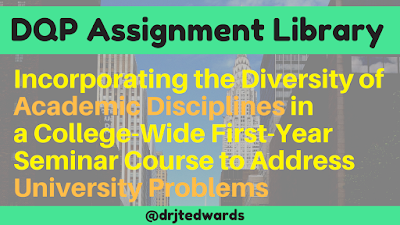All five of the LEAP Texas Fellows collaborated together to form a collection of five similar assignments focused on the first-year seminar (our common link). During the charrette, we shared these assignments and received feedback focused on our assignment design. We incorporated this feedback and then we resubmitted our assignment for the Degree Qualifications Profile (DQP) library.
Check out my submission to the assignment library - Incorporating the Diversity of Academic Disciplines in a College-Wide First-Year Seminar Course to Address University Problems
Analytic inquiry
Broad and Integrative Knowledge
Communicative fluency
Ethical reasoning
Quantitative fluency
Use of information resources
Applied and Collaborative Learning
Civic and Global Learning
Engaging diverse perspectives
Intellectual Skills
Specialized Knowledge
Have a great week! Thanks for visiting the Millennial Professor Blog!
Dr. Jennifer T. Edwards
Follow Me on Twitter/Instagram - @drjtedwards
Subscribe to Millennial Professor on YOUTUBE!
Subscribe to Blog Updates on Facebook
Email Me! I am PR Friendly! - jennifertedwards@gmail.com




